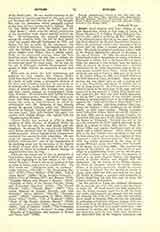

Byrd, WILLIAM, English composer, b. in London in 1542 or 1543; d. July 4, 1623. He was the son of a: musician, and studied music principally under Thomas Tallis. He became organist at Lincoln Cathedral in 1563, chorister in the Chapel Royal in 1570, and in 1575 received the title of Organist of the Chapel Royal without being obliged to perform the functions of that office. Byrd was the most distinguished contrapuntist and the most prolific composer of his time in England. Fetis calls him the English Palestrina. He was the first Englishman to write madrigals, a form which originated in Italy in the thirteenth century, and received its highest development in the sixteenth century at the hands of Arcadelt and other masters. An organist and performer of the first order upon the virginals, Byrd wrote for the latter instrument an enormous number of compositions, many of which are played today. His chief significance lies, however, in his compositions for the church, of which he produced a great many. In 1607 he published a collection of gradualia for the whole ecclesiastical year, among which is to be found a three-part setting of the words of the multitude in the Passion according to St. John. A modern edition of this setting was published in 1899. In 1611 “Psalms, Songs and Sonnets, Some Solemn, Others Joyful, Framed to the Life of the Words, Fit for Voyces or Viols, etc.” appeared. Probably in the same year was issued “Parthenia”, a collection of virginal music, in which Byrd collaborated with J. Bull and Orlando Gibbons. Three masses, for three, four, and five voices, respectively, belong to the composer’s best period. The one for five voices was reprinted by the Musical Antiquarian Society in 1841, and in 1899 the same work was issued by Breitkopf and Hartel. Two of his motets, “Domine, ne irascaris” and “Oivitas sanetis to”, with English texts, are in the repertoire of most Anglican cathedrals. In spite of the harrowing religious conditions under which he lived, in the reigns of Queen Elizabeth and James I, Byrd remained faithful to his principles and duties as a Catholic, as is shown in his life and by his works. In his last will and testament he prays “that he may live and dye a true and perfect member of the Holy Catholike Churche withoute which I beleeve there is noe salvacon for me”.
JOSEPH OTTEN

